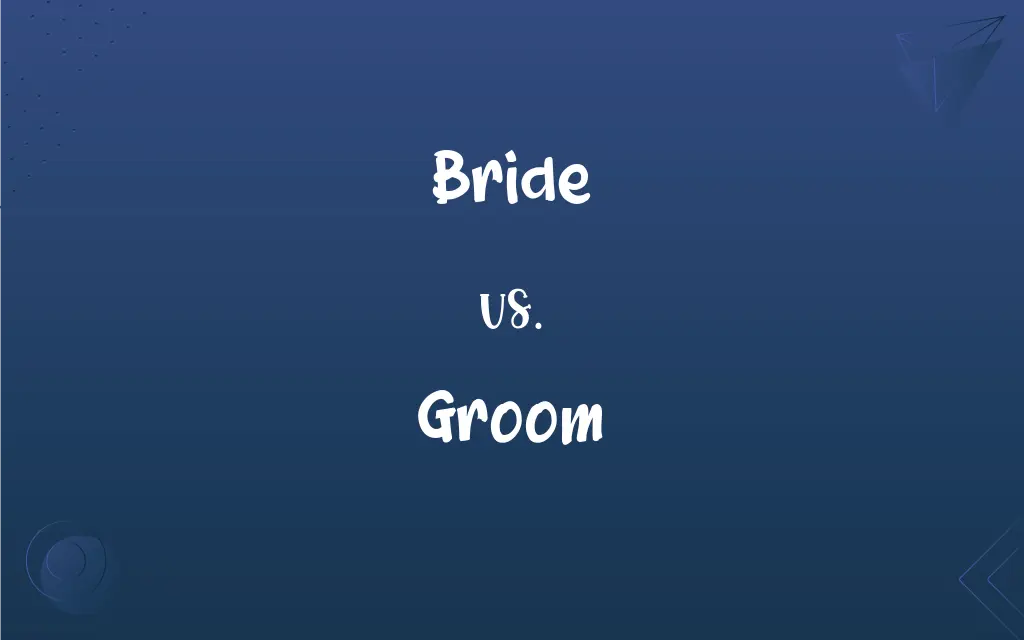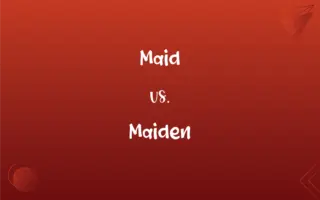Bride vs. Groom: What's the Difference?
Edited by Aimie Carlson || By Janet White || Updated on October 7, 2023
A "bride" is a woman on her wedding day or just before and after the event. A "groom" is her male partner at that time, often referring to a man on his wedding day or just before and after the occasion.

Key Differences
A "bride" and a "groom" are terms associated with wedding ceremonies, referring to two individuals entering into matrimony. A "bride" denotes a woman who is about to be married or who has just been married. Typically, the bride is the center of attention in many wedding traditions, often characterized by a special dress or attire. In contrast, the "groom" represents the man who is about to get married or who has just gotten married. The groom often has specific responsibilities and roles in wedding traditions, distinct from those of the bride.
While the terms "bride" and "groom" are specifically gendered, referencing a woman and a man respectively in a wedding context, they carry with them a variety of cultural and traditional connotations and expectations. The bride is often associated with beauty, purity, and virtue, symbolized by elements like the white wedding dress. Conversely, the groom is commonly linked to notions of strength, support, and provision, reflected in his role as the prospective or new husband. Both terms, however, are integral to the concept of weddings and matrimonies, representing the union of two individuals in marriage.
"Bride" and "groom" refer to different roles within the marriage ceremony and the ensuing marital relationship. The bride, as the female participant, often follows specific traditions and customs related to her attire, entry, and conduct during the wedding. She may be escorted by her father or a significant male figure and given away to the groom. The groom, on the other hand, as the male participant, may await the bride's arrival at the altar and may have duties like safeguarding the wedding rings. Despite these gender-specific roles and traditions, the bride and the groom share the common goal of committing to each other in matrimony.
The terms "bride" and "groom" hold significance not just on the wedding day but also in the time leading up to and following the ceremony. The bride typically engages in pre-wedding activities such as bridal showers and may be the subject of bridal photography. The groom, too, participates in pre-wedding traditions like bachelor parties and may partake in groom-specific customs. While the customs and traditions associated with brides and grooms vary widely across cultures, the essence of these terms lies in their representation of the individuals uniting in marriage.
Comparison Chart
Definition
A woman on her wedding day or just before and after it.
A man on his wedding day or just before and after it.
ADVERTISEMENT
Role
Often the center of attention with specific attire.
Has distinct responsibilities and roles in the wedding.
Representation
Represents beauty, purity, and virtue in many traditions.
Often represents strength, support, and provision.
Activities
Engages in bridal showers and bridal photography.
Participates in bachelor parties and has specific duties.
In a Relationship
Referred to as the wife post the wedding ceremony.
Referred to as the husband post the wedding ceremony.
Bride and Groom Definitions
Bride
A woman engaged to be married.
The bride was busy with the wedding preparations.
ADVERTISEMENT
Groom
A newly married man.
The groom greeted the guests warmly at the reception.
Bride
A newly married woman.
The bride looked content at the reception.
Groom
A person employed to take care of horses or a stable.
Bride
The female partner in a wedding ceremony.
The bride and groom exchanged vows.
Groom
A man who is about to be married or has recently been married.
Bride
A woman on her wedding day.
The bride walked down the aisle with grace.
Groom
One of several officers in an English royal household.
Bride
A woman who is about to be married or has recently been married.
Groom
A man.
Bride
A woman in the context of her own wedding; one who is going to marry or has just been married.
Groom
A male servant.
Bride
An object ardently loved.
Groom
To care for the appearance of; to make neat and trim
Groomed himself carefully in front of the mirror.
Bride
An individual loop or other device connecting the patterns in lacework
Groom
To clean and brush (an animal).
Bride
(obsolete) to make a bride of
Groom
To remove dirt and parasites from the skin, fur, or feathers of (another animal).
Bride
A woman newly married, or about to be married.
Has by his own experience triedHow much the wife is dearer than the bride.
I will show thee the bride, the Lamb's wife.
Groom
To prepare, as for a specific position or purpose
Groom an employee for advancement.
Bride
Fig.: An object ardently loved.
Groom
(Sports) To prepare (terrain) for participants in a sport, as by packing down new snow and leveling moguls for skiers.
Bride
To make a bride of.
Groom
To care for one's appearance.
Bride
A woman who has recently been married
Groom
A man who is about to marry.
Bride
Irish abbess; a patron saint of Ireland (453-523)
Groom
A person who looks after horses.
Bride
A woman participant in her own marriage ceremony
Groom
One of several officers of the English royal household, chiefly in the lord chamberlain's department.
The groom of the chamber; the groom of the stole
Bride
A woman about to be married or newlywed.
The bride’s joy was evident to all.
Groom
(archaic) A male servant, or more generally, a common man.
Groom
A brushing or cleaning, as of a dog or horse.
Give the mare a quick groom before you take her out.
Groom
To attend to one's appearance and clothing.
Groom
(transitive) To care for (horses or other animals) by brushing and cleaning them.
Groom
(transitive) To prepare (someone) for election or appointment.
Groom
(transitive) To prepare (a ski slope) for skiers by packing down the snow.
Groom
(transitive) To attempt to gain the trust of (somebody, especially a minor) with the intention of subjecting them to abusive or exploitative behaviour such as sexual abuse or human trafficking.
Groom
In agile software development, to review and prioritize the items in the development backlog.
Groom
A boy or young man; a waiter; a servant; especially, a man or boy who has charge of horses, or the stable.
Groom
One of several officers of the English royal household, chiefly in the lord chamberlain's department; as, the groom of the chamber; the groom of the stole.
Groom
A man recently married, or about to be married; a bridegroom.
Groom
To tend or care for, or to curry or clean, as a, horse.
Groom
A man participant in his own marriage ceremony
Groom
Someone employed in a stable to take care of the horses
Groom
A man who has recently been married
Groom
Prepare (someone) for a future role or function;
He is grooming his son to become his successor
The prince was prepared to become King one day
They trained him to be a warrior
Groom
Give a neat appearance to;
Groom the dogs
Dress the horses
Groom
Care for one's external appearance;
He is always well-groomed
Groom
A man on his wedding day.
The groom awaited the bride’s arrival at the altar.
Groom
A man engaged to be married.
The groom discussed the wedding plans with his fiancée.
Groom
A man about to be married or newlywed.
The groom's excitement was palpable.
Groom
The male partner in a wedding ceremony.
The groom slipped the ring onto the bride’s finger.
FAQs
Do the terms "bride" and "groom" always refer to women and men respectively?
Traditionally, yes, but they can be used in same-sex marriages to represent the two individuals getting married.
Do the bride and groom have to have separate pre-wedding parties?
It’s a tradition but not a requirement; some couples choose to have joint pre-wedding celebrations.
Is the attire of the bride more important than the groom’s?
Cultural values vary, but in many traditions, emphasis is often placed on the bride’s attire.
Can "bride" and "groom" be used outside of wedding contexts?
While specific to weddings, they can metaphorically describe anyone entering into a new phase or commitment.
Can "bride" and "groom" be used to refer to the same person?
No, as they refer to different individuals entering into marriage, but non-binary or gender-fluid terms may be used.
Are the roles of the bride and groom fixed in a wedding ceremony?
Traditionally, there are fixed roles, but many modern weddings allow for flexibility and personalization.
Is it mandatory for the bride to be given away to the groom?
It’s a tradition in some cultures, but not mandatory, and some couples choose alternative approaches.
Are the terms "bride" and "groom" becoming outdated?
They remain prevalent but are evolving, with some preferring more inclusive or gender-neutral terms.
Are "bride" and "groom" used universally in all cultures?
The concepts are universal, but cultures have different terms and traditions for brides and grooms.
Are the bride and groom responsible for planning their wedding?
While they often are involved, families, friends, or wedding planners may also take on planning roles.
Can the bride and groom have a wedding without guests?
Yes, some choose to have private ceremonies or elopements without guests.
Can the groom see the bride before the wedding ceremony?
Tradition discourages it, but it’s a personal choice, and some couples do see each other before the ceremony.
Can the bride and groom leave the wedding ceremony together?
Yes, it’s common for the newlyweds to exit the ceremony together, often leading their guests.
Is the father of the bride responsible for giving the bride away to the groom?
It’s a common tradition, but the bride may choose anyone or opt for a different approach.
Is it necessary for the bride and groom to exchange rings?
It’s a common tradition but not obligatory; some couples choose different symbols or actions.
About Author
Written by
Janet WhiteJanet White has been an esteemed writer and blogger for Difference Wiki. Holding a Master's degree in Science and Medical Journalism from the prestigious Boston University, she has consistently demonstrated her expertise and passion for her field. When she's not immersed in her work, Janet relishes her time exercising, delving into a good book, and cherishing moments with friends and family.
Edited by
Aimie CarlsonAimie Carlson, holding a master's degree in English literature, is a fervent English language enthusiast. She lends her writing talents to Difference Wiki, a prominent website that specializes in comparisons, offering readers insightful analyses that both captivate and inform.































































